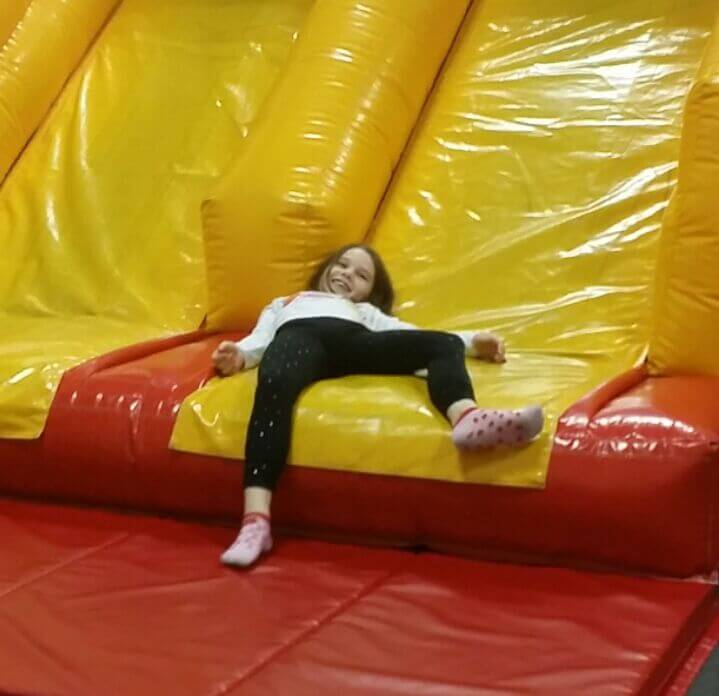You can discover more about a person in an hour of play than in a year of conversation.
Plato
I recently was an honored guest at my granddaughter’s sixth birthday party at Bounce U.
“Bunce U” is a maze of overstuffed, air-filled, cushiony pathways that invite running up a mountain, then sliding down collapsed in delight.
I watched 13 kids, ages 5 to 10, literally bounce off the walls. Not only was each kid magnetically sucked into the magic of wild and unexpected human movement, all of us watching joined in the spirit as pure fun invaded our normally self-contained existence.
I psychologically joined in as my young gymnast granddaughters exploded into jumping to loud music with pure abandon.
As “the birthday girl” a camera followed Sara, who tackled this world of pure fun. She first headed to a protected area of huge air-filled fabric pillows that allow high jumping with no fear of bodily damage.
She levitated to uproariously loud and energetic music that bombarded her senses with the need to jump, to dare and to create silly moments.
Grabbing the cell phone camera that is an extension of my right arm at moments like this, I found myself compelled to join in the fun. Since I was not invited to bounce, and doubted that the equipment would recover if I did, photography became my way of enrolling in Bounce U for this short course: I was drawn into the moments with full emotional delight: kids bounced higher than I thought their short legs could carry them. Wild activity reigned supreme under the careful guidance of elegantly trained staff.
While one pile of kids tried to scale the heights of a pillowy mountain in order to slide, loose-limbed, down, another jumped to music that made standing still impossible. Smiles from ear to ear decorated faces of young bodies so agile that no challenge was too great.
The sheer delight I was part of got me to wondering about whether pure physical fun can help us normal mortals battle anxiety and depression, so off I went to research-land to find out. I was in no way disappointed. Here, highlights of what I learned:
- Bob Hughes’s Evolutionary Playwork tells us “The growing body of scientific evidence confirms a direct relationship between play, evolution and brain growth… play work should …be viewed as comprehensive support for deep biological processes—expressed through mechanisms like adaptation, flexibility, calibration and the different play types—that enabled the human organism to withstand the pressures of extinction.”
So, not only is playing essential for the psychological well-being of our children, but it seems to be essential in thriving, which includes avoiding depression and anxiety. Play matters: it increases our quality of life.
- Hughes also reports “An increase in brain size and organization, an increased ability to roll with the punches, improvements in resilience and optimism, greater mental flexibility in problem solving, the development of cortical maps, and an increase in successful adaptive strategies …”
We get all this from play. Play is essential to welfare, providing physical exercise, cognitive development, and social skills. It also trains kids for the unexpected, enabling physical and emotional balance, all great skills in reducing anxiety and depression.
- Depriving people of play and recreation can has been linked to criminality, obesity, and declining creativity. Unstructured play, where playmates strategize moves, provides the most sumptuous nourishment for both body and spirit.
- Play correlates with reduced sociopathy or serious crimes. Stuart Brown, studied male murderers, many of whom had experienced deep “play deprivation and other major play abnormalities…” He concluded, “Normal play behavior was virtually absent throughout the lives of highly violent, antisocial men, regardless of demography.”
Severely play-deprived children manifest multiple psychopathologies: conversely, the histories of successful, creative people show social play’s vital part in healthy development.
- As I suspected, the absence of play is correlated with a variety of psychiatric disturbances. As Mark Bekoff says, “Animals, including humans, learn the rules of the game and there is strong selection for fair play because those who violate it can suffer from not being part of the group.”
In sum, Dr. Gray, author of “Free to Learn,” says “What I think is the most dramatic effect of the play deficit: the increase in childhood depression, anxiety and self-control…over the past half-century”
Thank you, Bounce U, for tapping into best health in the most delightful of manners. And thanks to my granddaughters’ buddies, whose antics informed me of the importance of fun in every single day of our lives.
To Consider: Do you, like most of us, overlook the salient health benefits of good, clean play in your effort to make life work? What have you been missing? How can you make needed shifts? Will you be glad you did?
To Read: Mark Bekoff…Rewilding Our hearts.
Find Dr. Judith Coche helping clients benefiting from adult play and learning to live optimal lives at The Coche Center, LLC, a Practice in Clinical Psychology in Stone Harbor and Rittenhouse Square.








